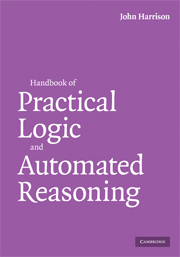2 - Propositional logic
Published online by Cambridge University Press: 30 September 2009
Summary
We study propositional logic in detail, defining its formal syntax in OCaml together with parsing and printing support. We discuss some of the key propositional algorithms and prove the compactness theorem, as well as indicating the surprisingly rich applications of propositional theorem proving.
The syntax of propositional logic
Propositional logic is a modern version of Boole's algebra of propositions as presented in Section 1.4. It involves expressions called formulas that are intended to represent propositions, i.e. assertions that may be considered true or false. These formulas can be built from constants ‘true’ and ‘false’ and some basic atomic propositions (atoms) using various logical connectives (‘not’, ‘and’, ‘or’, etc.). The atomic propositions are like variables in ordinary algebra, and we sometimes refer to them as propositional variables or Boolean variables. As the word ‘atomic’ suggests, we do not analyze their internal structure; that will be considered when we treat first-order logic in the next chapter.
Representation in OCaml
We represent propositional formulas using an OCaml datatype by analogy with the type of expressions in Section 1.6. We allow the ‘constant’ propositions False and True and atomic formulas Atom p, and can build up formulas from them using the unary operator Not and the binary connectives And, Or, Imp (‘implies’) and Iff (‘if and only if’). We defer a discussion of the exact meanings of these connectives, and deal first with immediate practicalities.
The underlying set of atomic propositions is largely arbitrary, although for some purposes it's important that it be infinite, to avoid a limit on the complexity of formulas we can consider. In abstract treatments it's common just to index the primitive propositions by number.
Information
- Type
- Chapter
- Information
- Handbook of Practical Logic and Automated Reasoning , pp. 25 - 117Publisher: Cambridge University PressPrint publication year: 2009
